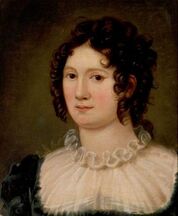 Claire Clairmont
Claire Clairmont Claire already had a daughter by Lord Byron, and she went with Shelley to Venice, ostensibly to visit her little daughter. So Claire was travelling with Shelley for several weeks without Mary, something which would raise eyebrows even today.
In Venice, Claire and Shelley met the English consul-general, Richard Hoppner and his wife. Claire's little daughter Allegra was living with them, instead of with her father Lord Byron, whose home and lifestyle was unfit for a child.
Shelley wrote a letter to Mary, telling her about the Hoppner letter:
First, let's pause to exclaim, along with Victorian-era Shelley biographer Thomas Cordy Jeaffreson, "Shelley said what to his wife?"
| Shelley, (the poet who according to his idolators might have been the Savior of the World), positively tells her that, if he had lived in adultery with her sister-by-affinity under her own roof, he would have been guilty of nothing worse than a 'great error.' |
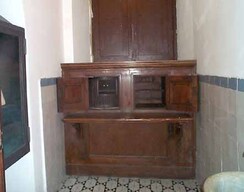 Baby hatch at the Church of the Annunziata in Naples
Baby hatch at the Church of the Annunziata in Naples Incidentally, at this time in Italy and in many places, churches made provision for desperate women to abandon their babies safely. (Of course when I say "safely," there was still a horrific infant mortality rate at the time). They could come to the church or foundling home in secrecy, deposit the baby anonymously in a device that resembled a lazy susan, and the baby would be taken into the foundling home and raised by nuns.
This kind of arrangement still survives in mainland China to this day. Parents can give up children whom they cannot provide for, or who are born out of wedlock, without fear of reprisal.
However, Shelley did not dispose of Elena Adelaide in this fashion, although the possibility exists that he might have adopted her from a foundling home. So, Shelley could have replied to the Hoppner letter with perfect honesty, "Hey, I never abandoned a child in a foundling home!" But he didn't say anything. He left it up to his wife, who had nothing to do with any of it.
Shelley wrote Mary, as we have seen, repeating the details of the allegations. He then asked her to answer the Hoppner letter and defend his honour. which she promptly did, in a passionate letter.
Most of Mary's letter is taken up with telling Mrs. Hoppner how much she loves Shelley and how inconceivable it is that anyone could believe this terrible gossip about her wonderful husband, gossip which is so dreadful she would rather die than repeat it:
| I write to defend him to whom I have the happiness to be united, whom I love and esteem beyond all living creatures, from the foulest calumnies... to you I swear by all that I hold sacred upon heaven and earth, by a vow which I should die to write if I affirmed a falsehood, I swear by the life of my child, by my blessed, beloved child, that I know the accusations to be false. |
Mary asserts: "I am perfectly convinced in my own mind that Shelley never had an improper connexion with Claire... Claire had no child."
Shelley buffs have said, "Ah-ha, she said, 'Claire had no child," she didn't say, 'there was no child.' And somebody must have had one, because there was a baby--Elena Adelaide." Further, Mary does not directly address the accusations about abandoning a child or attempted abortion, except to say it couldn't possibly be true and the idea is so vile she can't even write the words.
People who have tried to sort out truth from falsehood and fact from gossip in this affair are confounded by the behaviour of everyone involved.
If Elise entered a shot-gun marriage with Paolo Foggi, why didn't they keep the baby?
If Elena Adelaide was Elise's baby, as some have suggested, why would Elise open this can of worms with anybody, and why wouldn't Shelley and Mary say, "there was a baby, and it is the baby of Elise and our rascally ex-servant"?
Why would Shelley put his name on the birth certificate unless it was his child or unless he intended to adopt the baby and raise it as his own child. And if he needed or wanted to adopt a baby girl the night before he left Naples, why?
If Claire was the mother, why was she content to abandon the child with a Neapolitan family? She was heart-broken when she had to give her daughter Allegra to Lord Byron to raise; she greatly regretted doing so.
If Claire wasn't Shelley's mistress, why didn't Mary and Shelley insist that she write a letter to the Hoppners, telling them to stop spreading horrible gossip about her? These rumours affected her reputation as much as Shelley's and were more damaging for a lady than for a man.
OTOH, if Claire was Shelley's mistress, why did Shelley turn to his wife to defend him and why did she agree to do it?
If Elena Adelaide was a Neapolitan foundling whom Shelley adopted to help console Mary for the loss of their daughter Clara, why isn't that mentioned in the letter to the Hoppners? It would explain where the bizarre story came from and put the matter to rest.
Why did Shelley leave it up to his wife, who didn't go to Venice, to insist that he and Claire didn't have an affair? Was he just too distraught? Was he implying that the whole worrisome, ghastly business was beneath his notice? Is asking your wife to mop up a mess like this a very nice thing to do?
But.... what if Shelley wanted Mary to write the denial precisely because she didn't know the whole truth? Whereas if he wrote a denial, he knew he would be lying about some or all of it?
And don't forget the mysterious lady. Why was Shelley telling Lord Byron and others that he was being pursued by a mysterious lady?
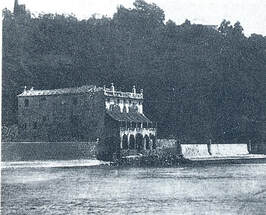 Casa Magni, Shelley's last home
Casa Magni, Shelley's last home As Shelley biographer Richard Holmes notes, "this was done in a quite innocent and beseeching way and without a hint of blackmail." This is further evidence, as far as I'm concerned, that there never was a blackmail attempt--the supposed blackmail by Paolo Foggi was just an invention of Shelley's to explain why he had to see his lawyer in Pisa.
| In my forthcoming novel, A Different Kind of Woman, I have provided some answers to these mysteries. Update: I have also excerpted and expanded my story about Shelley and this literary mystery in a separate novella, Shelley and the Unknown Lady. Love my cover by Dissect Designs! Previous posts in this series: Shelley and the Mysterious Lady Shelley: Pursued or Pursuer? In the Deep Wide Sea of Misery Who was Elena Adelaide? A Falsified Birth Certificate What happened to Elena Adelaide? Paolo Foggi, that superlative rascal Update: An interesting find in Naples Update July 2023: I'm starting a new mini blog series on Percy Bysshe Shelley and the mysterious doings in Wales. |

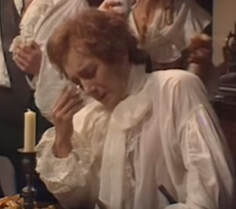
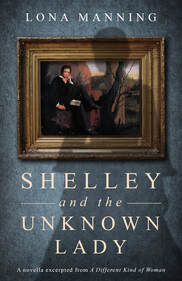
 RSS Feed
RSS Feed